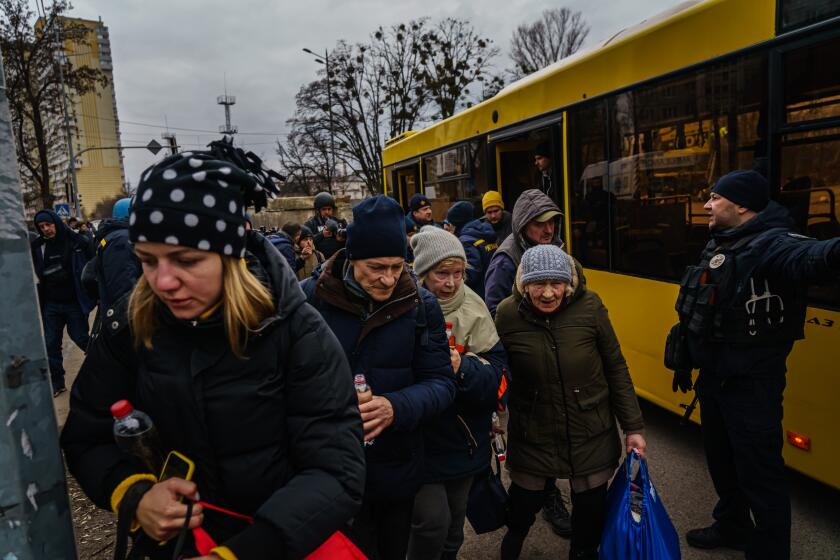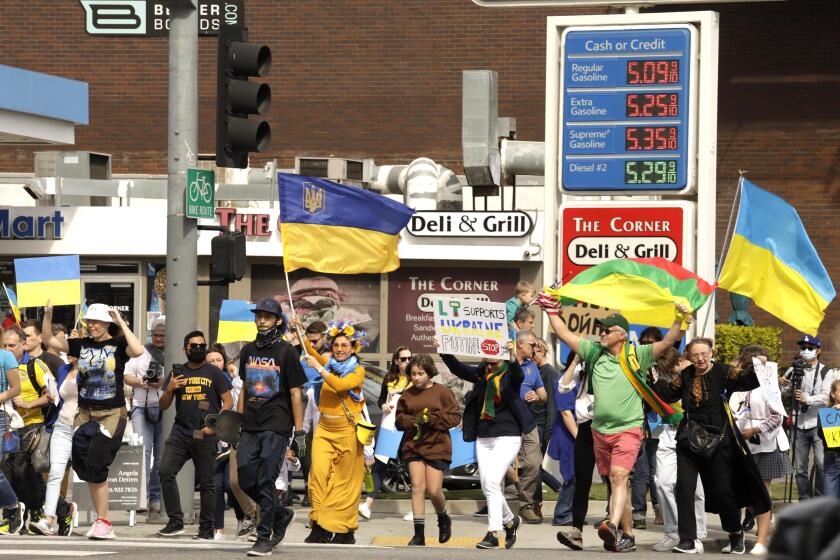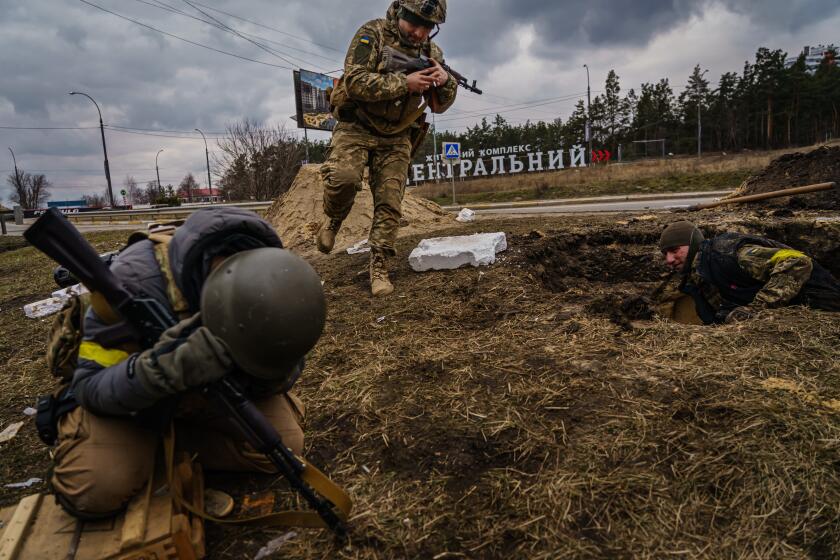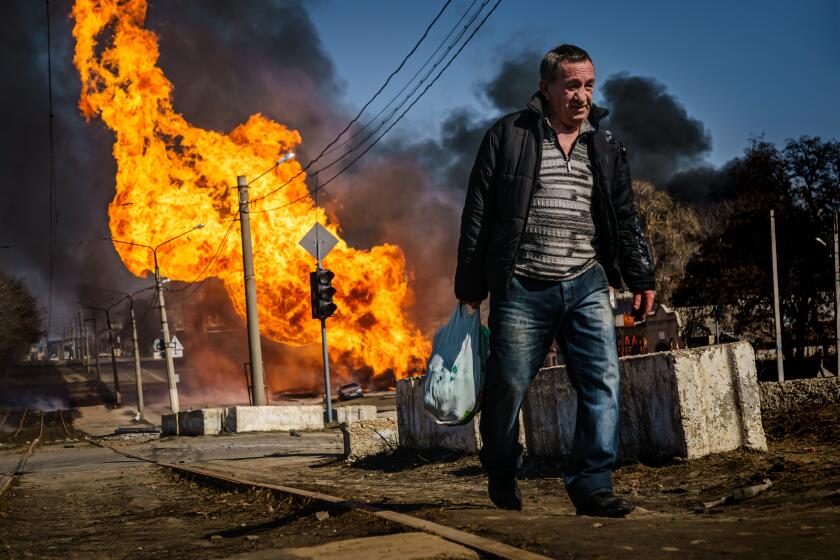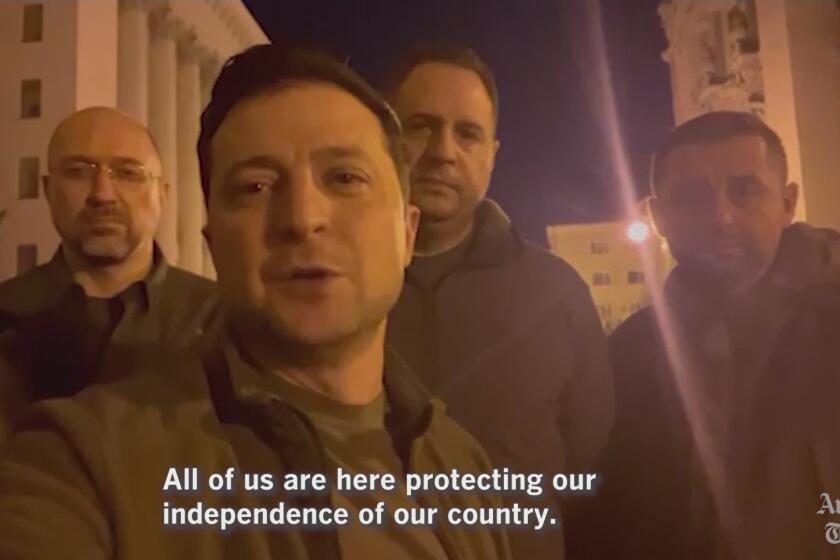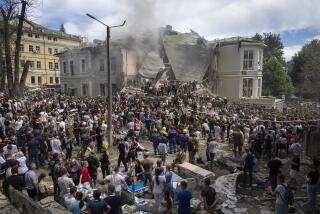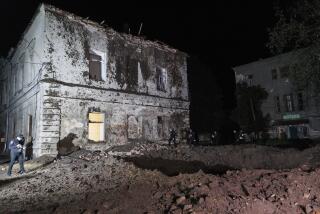Russia bombs maternity hospital amid evacuation effort, Ukraine says

Ukrainian authorities had identified routes agreed on with Moscow for the safe exit of civilians, but previous cease-fires have mostly failed.
- Share via
KOZELETS, Ukraine — With basic survival in Ukraine growing increasingly precarious, civilian evacuation efforts sputtered yet again Wednesday as Russian bombs slammed into a maternity hospital.
Ukraine’s government had announced a daylong cease-fire for several corridors around the country that were designated for the safe exit of residents. The routes covered some of the hardest-hit areas, including the southern port city of Mariupol, where hundreds of thousands of civilians have been trapped for days with no electricity and water and dwindling supplies of food and medicine.
But late Wednesday afternoon, Russia appeared to break the cease-fire when bombs hit a Mariupol hospital complex, injuring 17. Images showed emergency responders carrying a bloodied pregnant woman through a courtyard littered with mangled cars and a heavily damaged building still smoldering.
The bombs added to the misery of a blockaded city where hungry residents have begun breaking into stores and officials dug a mass grave to bury dozens of soldiers and civilians killed in recent days.
President Volodymyr Zelensky called the hospital attack “beyond an atrocity” and appealed again to the West to impose a no-fly zone over Ukraine so Russia “no longer has any possibility to continue this genocide.”
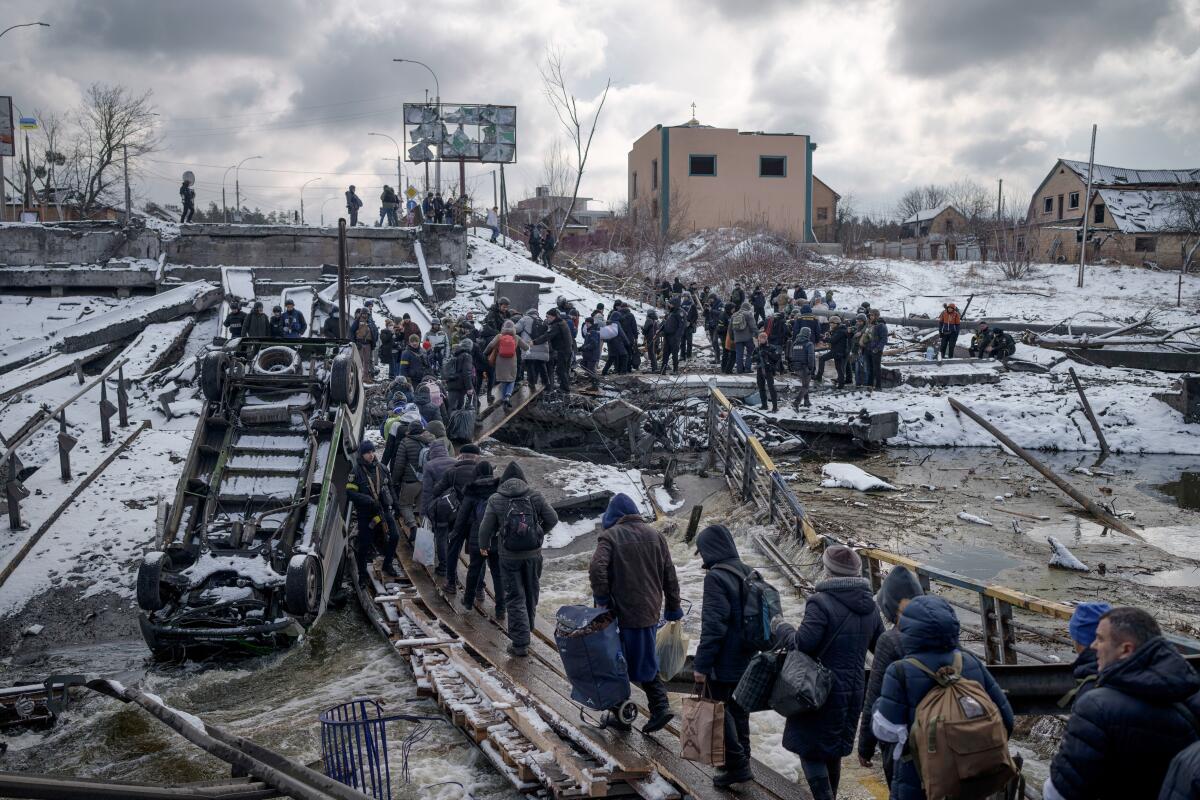
The attack prompted international outrage, with a top U.S. State Department official demanding that Russia “stop these heinous acts now.”
Still, Western officials continued to rule out the possibility of a no-fly zone for fear that it could escalate the conflict.
“If I were in President Zelensky’s position, I’m sure I would be asking for everything possible,” Secretary of State Antony J. Blinken said during a news conference in Washington.
But, he said, the U.S. and the North Atlantic Treaty Organization want to end “senseless bloodshed” and not provokeRussia by flying in aircraft or launching attacks from NATO countries.
“Our goal is to end the war, not to expand it,” Blinken said.
That is also why the U.S. has said it will not transfer fighter jets to Ukraine as proposed by Poland, Pentagon spokesman John Kirby said Wednesday, saying it was too “high risk.”
A no-fly zone to protect Ukraine from Putin’s bombs would involve complex ground operations and risk U.S.-Russian conflict and wider war in Europe.
American officials were caught off guard when the Polish government said Tuesday that it would send about two dozen Soviet-era MIG-29 fighter planes to the U.S. air base at Ramstein, Germany. Polish officials apparently had hoped the U.S. would then deliver the planes to Ukraine, whose pilots are trained on the aircraft.
Kirby said the aircraft are “not likely to significantly change the effectiveness” of the Ukrainian resistance and warned that the move could “be mistaken as escalatory” and result in a broader conflict with Russia.
U.S. lawmakers and military officials have looked for alternative ways to support Ukraine, with Congress agreeing Wednesday to send $13.6 billion in aid to the beleaguered country and Defense Department officials moving Patriot missile-defense systems to Poland, where Vice President Kamala Harris arrived for a three-day trip aimed at shoring up transatlantic efforts to isolate Russia.
U.S. officials have also continued to combat what they describe as a disinformation campaign waged by Russian President Vladimir Putin.
The White House on Wednesday condemned a Russian claim — echoed by Chinese officials — that the U.S. is developing chemical and biological weapons in Ukraine.
“It’s the kind of disinformation operation we’ve seen repeatedly from the Russians over the years,” White House Press Secretary Jen Psaki said on Twitter.
Americans and other outsiders are helping Ukraine mount a crowdfunding war online.
“Russia has a track record of accusing the West of the very violations that Russia itself is perpetrating,” Psaki said, warning Russia could use chemical weapons in Ukraine or create a “false flag” operation with their use.
Meanwhile, the bombardments across Ukraine continued despite a cease-fire agreement.
Russian shelling along the so-called humanitarian corridors has hampered civilian evacuation efforts for days, Ukrainian officials said, with only the route from Sumy to the city of Poltava seeing an appreciable number of evacuees. The routes all lead to other parts of Ukraine; Moscow had been criticized for its previous offer of safe routes that would funnel refugees to Russia and to its ally Belarus, which was a launchpad for invading forces from the north.
“Hundreds of people were saved. The humanitarian corridor was delivered,” Zelensky said of the Sumy evacuation. “But that’s only 1% of what needs to be done.”
He blamed the collapse of past cease-fires on Russian “savages” who kept up their attacks on defenseless civilians, and he urged patience among his compatriots who are trying to reach safety.
“Humanitarian corridors will still work,” Zelensky said. “And only time separates you from freedom.”
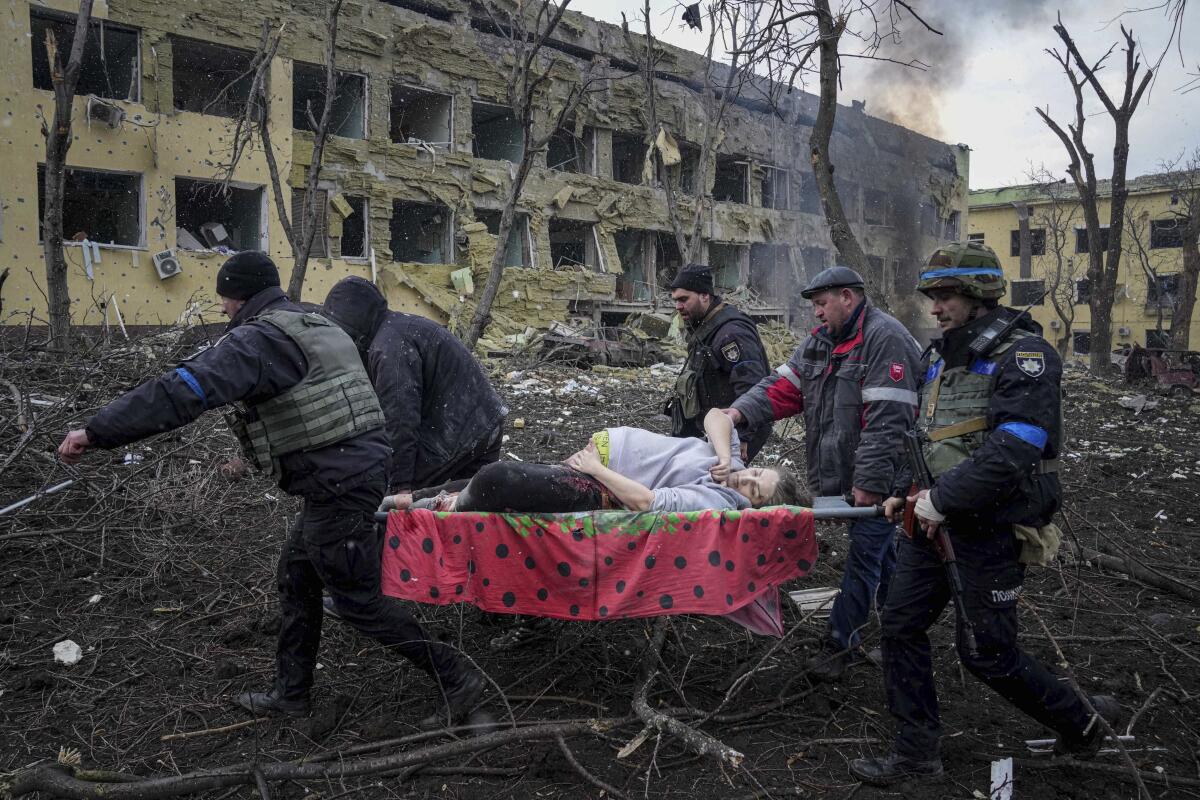
Zelensky, whose frequent video addresses in his military olive T-shirt have endeared him to his people for their mix of defiance and encouragement, thanked President Biden for his decision this week to ban Russian oil and gas imports.
“I’m grateful personally to U.S. President Biden for this decision, for his leadership, for this most powerful signal to the whole world,” the Ukrainian leader said. “It is very simple: Every penny paid to Russia turns into bullets and shells which are directed at other sovereign states.”
The U.S. sanctions targeting one of Russia’s most lucrative industries are part of a wider international effort to isolate the country from the world economy and sap its ability to wage war.
In recent days, a number of high-profile U.S. businesses have said that they would temporarily close locations in Russia or stop selling their products there, including McDonald’s, Starbucks and Coca-Cola.
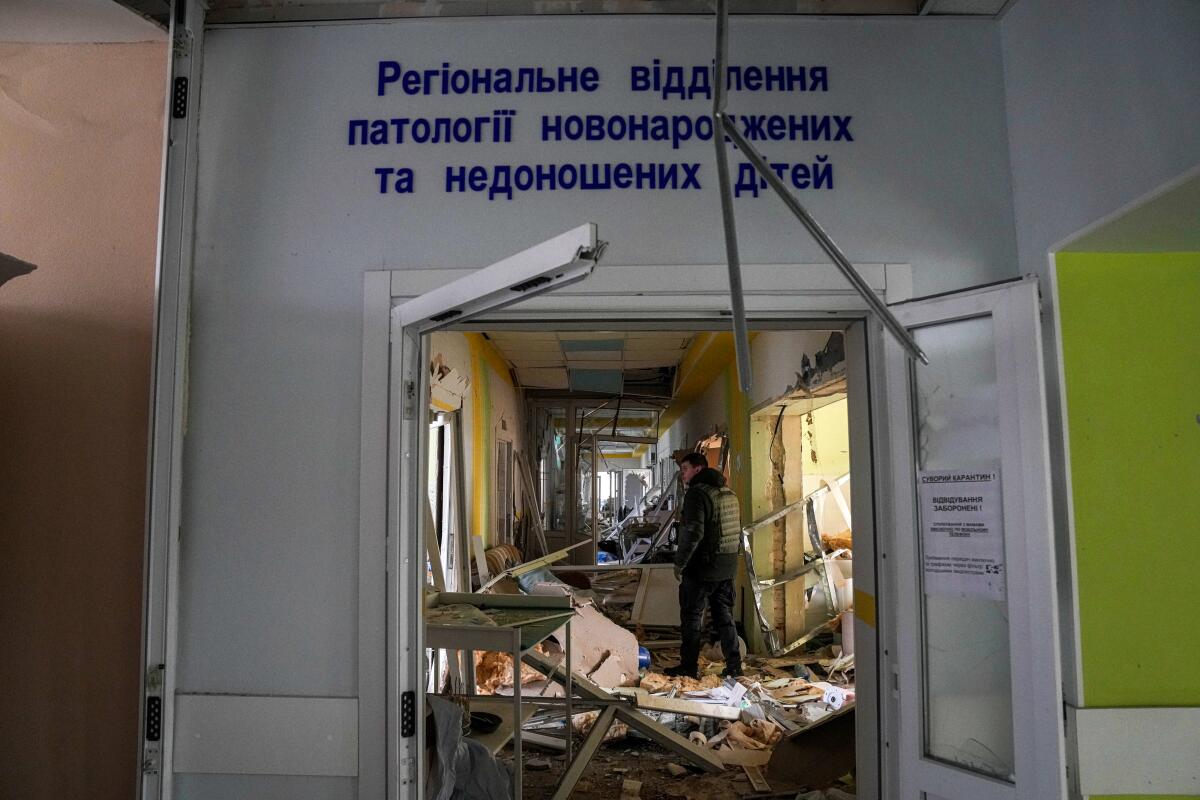
Ukrainian troops in Irpin, on the outskirts of Kyiv, dig in as a long column of Russian tanks advances toward them. They vow to fight to the end.
But whether the sanctions will be enough to slow Russia’s onslaught remained to be seen.
More than 2.1 million people have fled Ukraine in the last two weeks, the United Nations said, making it Europe’s fastest-growing refugee crisis since World War II. Most have gone west, to Poland and Hungary, in such numbers that others are now heading south, to Romania, to avoid the bottleneck.
Despite spirited resistance from both regular and irregular Ukrainian fighters, Russian troops continue to try to draw the net tighter around key cities. The Ukrainian military’s general staff said Russian forces were placing equipment at farms and residences around Chernihiv, about 80 miles northeast of Kyiv, the capital.
Residents of Chernihiv have been leaving the city to escape the heavy fighting, with some reporting that it was now under de facto Russian control. With the highway to Kyiv cut, those fleeing traversed backroads through small towns and villages.
In Kozelets, about halfway between Chernihiv and Kyiv, nervous villagers trained a machine gun at every passing car on the highway to the capital.
“Yesterday we had more than 100 refugees pass by from Chernihiv,” said Irina, an administrator in Kozelets who gave only her first name.
At a small local hospital, Andre Kholyavko, 32, was recovering from shrapnel wounds to his right arm, which lay bandaged by his side. Kholyavko left Chernihiv on Feb. 25, the second day of the invasion, evacuating his mother, wife and 4-year-old son to Slabin, a small village outside the city.
The Times’ Marcus Yam, no stranger to war photography, gives a first-person account from Ukraine.
“The day we left there were more than a hundred strikes,” he said.
But the Russian shells followed him: Late last week, as he collected wood with his son and his sister, rockets started raining down. “I barely had time to cover my son,” he recalled.
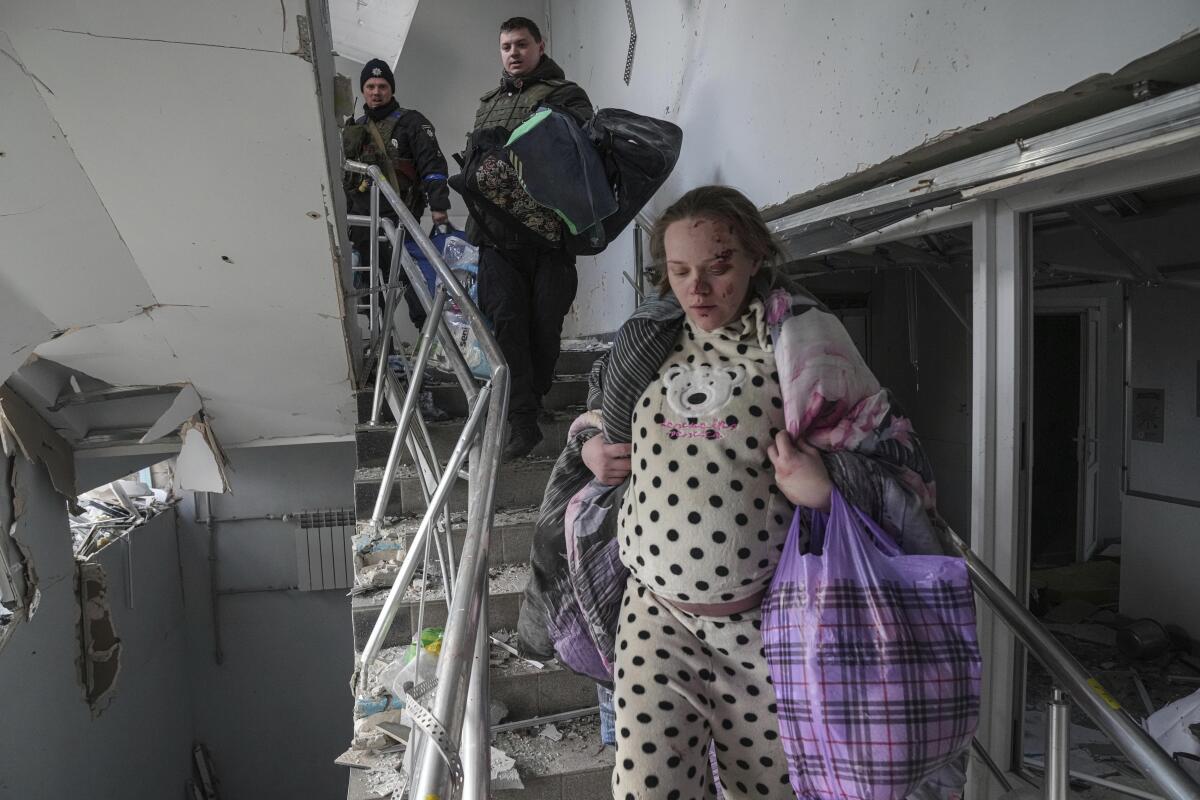
Ukrainian officials also said Wednesday that the decommissioned Chernobyl nuclear power plant — the site of the world’s worst nuclear accident, in 1986 — had lost access to the power grid, forcing it to rely on backup generators. Authorities called for a halt to fighting in the area, which is under Russian control, to allow for repairs, lest the plant suffer a catastrophic interruption to the cooling of radioactive material.
The International Atomic Energy Agency said it had been informed of the loss of electricity but saw “no critical impact on safety.” Utility company Ukrenergo said “military actions” meant there was currently “no possibility to restore” the plant’s connection to the grid.
Ukrainian President Volodymyr Zelensky’s social media savvy has helped give Ukraine a fighting chance against the Kremlin’s massive army and disinformation juggernaut.
In southern Ukraine, the military general staff warned that Russian soldiers disguised as civilians were trying to infiltrate Mykolaiv, a shipbuilding hub whose capture would help Moscow establish a stranglehold along the Black and Azov seas. Kherson, about 40 miles southeast of Mykolaiv, is now under Russian control — the only significant city so far to fall..
The Russians had overrun Mykolaiv’s airport, but it was retaken by Ukrainian forces, the region’s governor, Vitaliy Kim, said this week.
On Wednesday, Kim said food and water supplies remained stable, but some residents were leaving because of airstrikes.
“They are afraid of bombs,” he told the BBC.
The governor sounded an optimistic note on the city’s ability to hold out under the constant barrage.
“We’re going to defend and attack also. The enemy is very exhausted — he is without diesel and without ammo, no motivation,” Kim said. “So I think the situation is not very bad for us.”
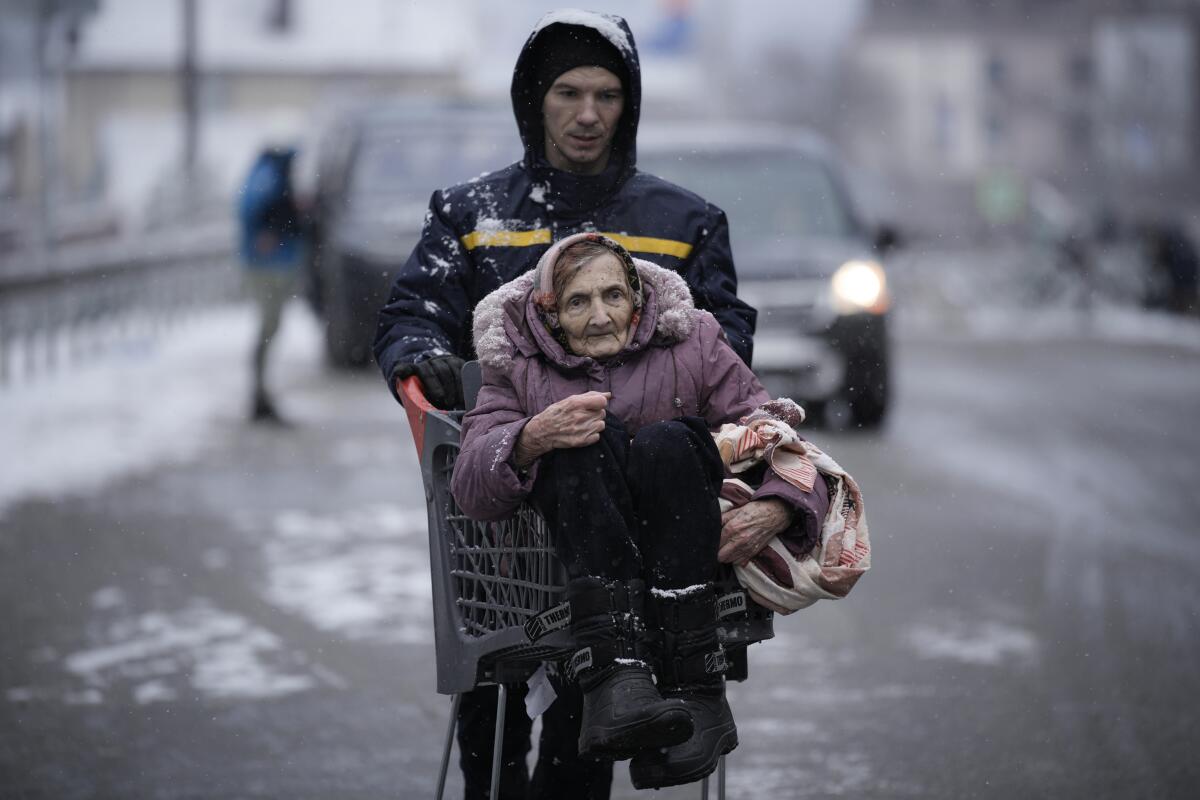
Bulos reported from Kozelets, Linthicum from Mexico City and Kaur from Washington. Times staff writers Andrea Castillo and Tracy Wilkinson in Washington contributed to this report.
More to Read
Sign up for Essential California
The most important California stories and recommendations in your inbox every morning.
You may occasionally receive promotional content from the Los Angeles Times.
